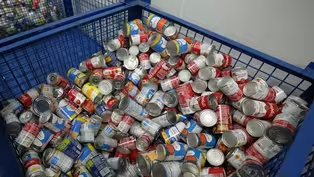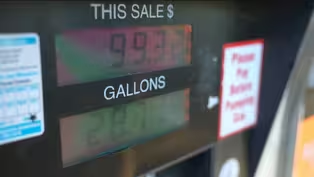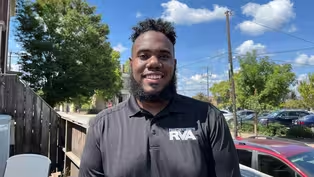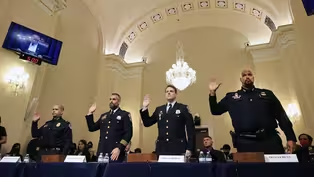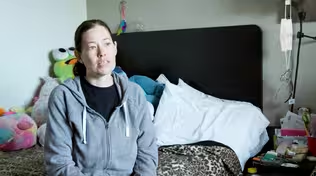VPM News Focal Point
Inflation | October 20, 2022
Season 1 Episode 12 | 26m 46sVideo has Closed Captions
How Virginians make ends meet, relying on hotels for housing and the free “Hygiene Pantry”
How do Virginians make ends meet during tough economic times? Some are forced to rely on hotels for housing due to the affordable housing crisis; grassroots non-profit provides a free “Hygiene Pantry” for people to give and take essential products.
Problems playing video? | Closed Captioning Feedback
Problems playing video? | Closed Captioning Feedback
VPM News Focal Point is a local public television program presented by VPM
The Estate of Mrs. Ann Lee Saunders Brown & Dominion Energy
VPM News Focal Point
Inflation | October 20, 2022
Season 1 Episode 12 | 26m 46sVideo has Closed Captions
How do Virginians make ends meet during tough economic times? Some are forced to rely on hotels for housing due to the affordable housing crisis; grassroots non-profit provides a free “Hygiene Pantry” for people to give and take essential products.
Problems playing video? | Closed Captioning Feedback
How to Watch VPM News Focal Point
VPM News Focal Point is available to stream on pbs.org and the free PBS App, available on iPhone, Apple TV, Android TV, Android smartphones, Amazon Fire TV, Amazon Fire Tablet, Roku, Samsung Smart TV, and Vizio.
Providing Support for PBS.org
Learn Moreabout PBS online sponsorshipANGIE MILES: As Virginians cope with the rising prices for food, fuel and more, we consider whether inflation is only part of the problem.
The high cost of housing has forced some families to take shelter in places never intended to be called home, and the products needed for basic hygiene are beyond what some people can afford.
We'll show you a project designed to help.
You're watching "VPM News Focal Point."
Production funding for VPM News Focal Point is provided by Dominion Energy, dedicated to reliably delivering clean and renewable energy throughout Virginia.
Dominion Energy, Actions Speak Louder.
The estate of Mrs. Ann Lee Saunders Brown.
And by... ♪ ♪ ANGIE MILES: Welcome to "VPM News Focal Point", I'm Angie Miles.
Prices are soaring for everything from eggs to electricity.
How are Virginians faring?
We'll share what we've learned, but first, we are going to look at a national issue through a Virginia lens.
The January 6th Committee voted last week to subpoena former President Donald Trump to testify about his actions that day.
New video shows House Speaker, Nancy Pelosi, calling Virginia Governor Ralph Northam and other leaders for help as the mob stormed the Capitol.
About 140 officers were assaulted, seven people died in connection with that event.
Members of law enforcement who defended the Capitol from rioters testified before the committee and some of them were recently honored by a Virginia university for their heroism.
Adrienne McGibbon has our Virginia Lens.
POLICE RADIO: We need to hold the doors of the Capitol.
AQUILINO GONELL: That day was like something from a Medieval battle.
We fought hand-to-hand, inch-by-inch to prevent an invasion of the Capitol by a violent mob intent on subverting our democratic process.
(audience applauds) ADRIENNE MCGIBBON: This fall, several of the police officers who protected lawmakers from the violent attack on January 6th were invited to accept an award for their actions that day.
They talked about what the nation can learn from the event.
AQUILINO GONELL: It's not hard standing up to the truth, but it's hard staying quiet.
ADRIENNE MCGIBBON: Carah Ong Whaley with the University of Virginia's Center for Politics says the award was created to bring attention to the threats facing democracy.
CARAH ONG WHALEY: We need to be thinking about truth and accountability, but also the need to have more responsive government institutions.
ADRIENNE MCGIBBON: The officers insisted that the events of January 6th should never be forgotten.
HARRY DUNN: Everybody knows how bad it was, even the people that are denying it.
They know how bad it was.
CARA ONG WHALEY: They've continued to face threats as they were the first to really testify before Congress and to call for accountability for what happened.
ADRIENNE MCGIBBON: Officer Daniel Hodges spoke about the importance of acknowledging what happened.
DANIEL HODGES: Five years from now, 10 years from now, 100 years from now, what's going to stop people from doing the same thing?
ADRIENNE MCGIBBON: After testifying before the committee, one of the Capitol rioters apologized to the officers.
Whaley says moments like that are a step forward.
CARA ONG WHALEY: I think we need to lean in to the conversations about January 6th and why it happened, but also having, you know, really deep conversations with people that we don't agree with.
POLICE RADIO: We have a breach of the Capitol.
MICHAEL FANONE: I've realized how fragile our democracy really is, how lazy we as Americans had become, taking things for granted like peaceful transfer of power.
You know, now we are suffering the consequences of that.
ANGIE MILES: In September, 38 year old Kyle Young was sentenced to seven years in prison for the dragging, beating and tasing of former officer, Mike Fanone, whom you saw in this story.
Fanone lives in Virginia, and is a past Trump supporter, now outspoken Trump critic.
His new book, "Hold the Line," was released this month.
ANGIE MILES: Earlier this year, America's rate of inflation hit a 40 year high, and although the rate has begun to drop, it's not moving fast enough to ease economic concerns.
The Consumer Price Index for September indicated an 8.3% increase over prices at the same time last year.
Across the state, Virginians have told us how inflation has affected them most.
TAYLOR HOLMES: Personally, it impacted me with rent.
Daycare is crazy.
Gas.
I remember the time when it used to take me $23 to fill up, and now my gas tank is almost $70 bucks to fill up.
MICAH BLACKWELL: I had the move, I had to pick up and move from where I live.
I'm a single father as well, so it got really hard being with the inflation rising so high.
MAKENNA FITZSIMMONS: I made the decision to look for other jobs where I could get paid more and maybe make up for some of that rising cost.
CHARLES RAY MARTIN: Food's gone sky high.
They haven't come down.
Food's still growing up, BRITTANY ROHRER: Inflation has impacted the amount of time I can spend with family, because when I moved down here, it was in May, so gas prices were high, but they've only become higher.
NATALIE BRAXTON: I would say going to the grocery store.
I mean, something I would probably buy and it takes me $10 is now cost me 30.
DAVID LEAKE: The price at the food stores that ... it affects every single person.
ANGIE MILES: Polling conducted by Christopher Newport University reveals that Virginians who identify as Republican list inflation as their top concern.
Democrats named climate change, racial inequality, and abortion as their leading issues, followed by inflation.
Examining the impact of inflation, we find the challenge goes deeper than current high prices.
ANGIE MILES: It's obvious at the pump and at the checkout.
Inflation is claiming a large share of people's monthly budgets and their time.
JANICE SHELTON: You spend more time in the grocery store trying to find cheaper brand name stuff, you know, like cereal, milk is off the chart, eggs is out of sight.
So to me, I think this inflation has really affected everyone.
I'm spending like almost two hours in the stores to get the things that I need, not things that I would like to have, but things that I need.
ANGIE MILES: Janice and William Shelton live in Mineral, Virginia.
They are retired and live with both medical challenges and a fixed income.
They travel nearly an hour to get to Loaves & Fishes in Charlottesville to receive the fresh healthy foods that sustain them.
The pantry, which Shelton calls the best around, has seen an increase in clients from all over Central Virginia over the past year.
And inflation has made things more challenging for those who donate both food and money.
JANE COLONY MILLS: We have seen a reduction in donations of meat, in particular.
Produce keeps getting higher.
About 34% of what we're getting in donations is now fresh produce, which is fantastic, 'cause that's what we want to be giving out.
But meat has dropped way down, and I think that's because of the cost, the price point.
ANGIE MILES: Jane Colony Mills says Loaves & Fishes has had a hefty increase in fuel costs for the trucks that pick up their donations.
And the cost of electricity for their refrigerators and freezers has also been significantly more.
The higher cost to the relief providers is evident as you move up the supply chain.
Loaves & Fishes is a partner agency of the Blue Ridge Area Food Bank.
GREG KNIGHT: Last spring and summer, to bring a load of fresh produce from Florida to here would've run us about $3,500.
This year, we experienced rates 5,000 to $5,500.
So a significant increase.
Six of the key items that we keep in our purchased inventory at all times.
The cost on those in particular is risen anywhere from 29 to 45%.
Canned peaches, for instance, very difficult to find right now.
In the past, that was the main canned fruit item that we kept on hand, but now the peaches are, either you can't get them or the cost is so much higher.
ANGIE MILES: Greg Knight oversees procurement of nearly 30 million pounds of food each year for an entity that's currently serving more than 100,000 people each month.
The dollars that help support the Blue Ridge don't go as far this year.
GREG KNIGHT: Right now, we've got about 60% less inventory on hand from the USDA today than we had this day a year ago.
So that's where inflation's going to impact us even more because to replace that food, we either have to get it donated or we have to purchase it.
So the purchase will be a higher cost.
ANGIE MILES: Blue Ridge is one of 200 food banks affiliated with Feeding America.
Blue Ridge CEO Michael McKee says the problems of food insecurity go beyond inflation, beyond COVID and reveal a more serious problem that America needs to confront.
MICHAEL MCKEE: The reality is people who are turning to food pantries for food assistance are doing so because they just don't have enough money to provide for themselves through conventional means.
And so whether it's because their housing cost is so high or childcare is so high, the insurance on their home, or car insurance is so high, the cost of food is so high, at the end of the month, there isn't enough to go around.
And so they're able to turn to a food pantry and get really wholesome healthy food for themselves, their children, members of the household.
ANGIE MILES: McKee provides the numbers.
Before the 2007 recession, about 70,000 people each month relied on support from Blue Ridge Area Food Bank and partner agencies.
During the recession, that number reached 120,000 Right before the pandemic, it was back down to 103,000 per month.
And then it peaked, at 130,000 during the COVID crisis.
Now McKee says, it's right at 110,000, but with inflation, likely to climb higher.
ANGIE MILES: Republican Congressional candidates have made inflation a major talking point ahead of next month's midterm elections.
Typically, midterms favor the party that's not in the White House, especially when the economy is problematic.
However, polling so far shows a slight advantage for Virginia Democrats over the GOP.
VPM News Focal Point is interested in the points of view of Virginians.
To hear more from your Virginia neighbors, and to share your own thoughts and story ideas, find us online at vpm.org/focalpoint.
ANGIE MILES: The affordable housing crisis has hit home statewide.
Many families are struggling to find and keep basic shelter.
Now, more families, like Amy Gillespie's, find themselves living in hotels.
It's a last resort.
Amy's mom helps support the family, they pay up to $400 a week to stay in a cramped Richmond hotel room.
Meet them now in part one of a two part series we produced with Mark Robinson of the Economic Hardship Reporting Project.
(water rushing) AMY GILLESPIE: Hi, I'm Amy Gillespie and I've been at Motel 6 for about four years now, since 2019.
Originally it was supposed to be just very short term, temporary.
I was working, I was like, I'll be able to save up some money to get out and find a place to live.
And then Coronavirus came and that kind of shut down a lot of things and it made it super hard to get out of the hotel situation because everything was shut down.
I had money saved up to use to move and then Corona came and it shut it down.
It is very expensive to live in a hotel.
It goes anywhere from 350 to 450 a week.
I pay probably, I would say maybe $1,500 a month.
And the reason I'm not able to find an apartment, or house, or anything is 'cause I don't have employment.
Since my daughter's been sick, I haven't been able to work.
She was diagnosed with stage three B-cell lymphoma cancer, so that has been an ongoing battle with that.
So this is my room.
I have a two bed hotel room.
So we have one bed here, and then we have the other bed over here.
Over here I have my toaster, my microwave, and my Instapot.
And also, all my food and stuff down there.
Canned goods.
Over here I have my burner, my stove burner.
And then in here is our bathroom.
We have a sink and stand up shower.
No bathtub, kind of sucks, but that's what we got.
This is the one sink that I have to use to wash dishes, and brush teeth, and all of that good stuff.
I have a hot plate in here, my bathroom, 'cause I cook and we can't cook too many things at once because of the power, it would trip the room circuit breaker.
So I have to cook in two separate locations.
I cook in here and I cook in the room.
And then I have all my pots and pans, utensils.
MARK ROBINSON: Richmond, Virginia is in the middle of a really big affordable housing crisis.
The crisis has gotten worse through the pandemic as rents have skyrocketed.
Historically you could find a two bedroom or three bedroom apartment in Richmond for 1000, 1100, $1,200.
Over the last two years, rents have gone up over 20%.
We've seen more families turning to hotels and motels as a form of long term housing.
KRISTIN RIDDICK: So there's no official number or census of families that are staying at hotels at any given time.
There is for people staying on the street, 'cause they are considered easier to count, they're easier to see, but families in hotels are invisible.
Especially because they are moving in and out so much.
They are staying in a hotel for a week, staying with friends for a week, staying with family members.
They split the household, so the kids are going one place and the parents are going another place or sleeping in their car.
So it's really hard to count and to get a good idea of how many people are actually in this situation because it changes every day.
AMY GILLESPIE: I would say, maybe at least 10 families are goin' through this at just this particular hotel.
But there's hotels all the way lined up here.
Not just here, there's hotels on south side, there's hotels all over the place that people are living there because they have nowhere to go and the shelters are full because people are being evicted out of their homes.
KRISTIN RIDDICK: People in hotels are not homeless enough.
They don't have access to traditional homeless services, which are reserved for people sleeping on the streets or in their car.
So you are completely blocked out from accessing anything like emergency shelter, rapid rehousing, permanent supportive housing.
If you are in need of those kinds of services, you're stuck.
You are kind of forced to figure out your own way out, and a lot of families just aren't able to do that without some kind of help.
AMY GILLESPIE: Yeah, I did not expect to be in this hotel this long, but life has happened.
Nobody wants to be here.
Nobody wants to be in a hotel living with their kids.
Spacing in a hotel is very hard, because for one you have no space to put anything, and for two, there's three of us in here.
So we have everybody's stuff in here, clothes, shoes, all the stuff that we wear every day.
Then I have extra sheets and towels and stuff if I need 'em.
But yeah, it's a lot.
Usually this is when my son come in, 'cause he's taller than me and he can put everything back, but it's okay for now.
So he can push it back with his tall hands.
They had their own rooms, I had my own room, we all had our own room.
If we got mad at each other, you could go to your room.
Bye, go to your room.
Where?
What room?
You want to go to the bathroom?
So it just makes it harder when you have a small area.
DAEKWON: You live in here, you eat here, you sleep here, you do everything here.
You come, go to work, and you come back home to here.
This is not no home.
This is not a home.
ARIANNA: I look up to my mother.
My mother is the best mother.
I wouldn't trade her for the world.
Pretty much, she sacrificed everything.
I mean, she sacrificed a lot.
She sacrificed her job, she sacrificed even her eating when she would feed us instead of feeding herself.
She sacrificed a lot.
So that's why, every chance I get, every chance I will get, I will always find a way to do something for her.
AMY GILLESPIE: Go back to your spot.
Go ahead.
Go ahead.
MARK ROBINSON: People who end up paying to keep these hotel rooms for long periods of time often have barriers to renting an apartment or a home.
Often they have bad credit, sometimes they have evictions on their records, sometimes they can't meet certain lease requirements like demonstrating two or three times the monthly rent in income.
Particularly for single parent-led households with children, that's almost impossible.
AMY GILLESPIE: The prices out here are ridiculous.
And it's like, we can't afford the type of rent prices that are out here now.
I don't even know how the people that are have 'em are affording the prices that they're paying, because... And food is goin' up, gas has went up, everything has gone up.
So everything is goin' up, but nobody's paycheck is goin' up, it's stayin' the same.
We really don't have space to put anything or do anything with.
We've been through so much, you know what I'm sayin'?
I want them to have stability.
And what I feel like when I'm in a hotel, yes it is stability, but it's not stability, if you can understand what I'm sayin'.
Yeah, this is okay, but I want to have you all in a house, I want an apartment, I want better things.
I don't want to settle for this.
This is not what I'm settling for.
I'm settling for it now, but this is not what I want.
I want my own place back.
ANGIE MILES: We'll have more on hotel housing in Virginia in part two of our report, airing soon on "VPM News Focal Point".
Inflation in the housing sector has become too much for many families already on the financial fence.
We spoke with several experts on money matters.
Salaam Bhatti with Virginia Poverty Law Center spoke about credit and debt collection, and Virginia Tech economist, Mike Ellerbrock, dealt with the big picture questions about inflation and the prospects of a recession.
ANGIE MILES: Can you give us some explanation for why inflation has become such a problem?
MIKE ELLERBROCK: Keep in mind that inflation is caused by more dollars chasing fewer goods, more dollars chasing fewer goods.
We're having inflation now, because our economy's actually coming out of hibernation from COVID.
Bad news is the war in Ukraine.
Ukraine is a major exporter globally of wheat corn, oil, steel and coal.
Another major factor is the supply chain disruption.
All those ships at sea.
Thirdly, OPEC's THIRDLY, OPEC'S politics are get GETTING increasingly complicated Those are major factors that are disrupting our economy.
ANGIE MILES: I'd like to get Mr. Bhatti into the conversation now.
We're talking about Biden's policies.
One of those, of course, is student debt relief.
What kind of pressure might that alleviate for households?
SALAAM BHATTI: When people have this opportunity, ultimately, of having their debt relieved, we're going to see up to about 20 million Americans have no more student debt.
And that means that things open up for so many of our neighbors, because so many people who have student debt are never going to have the opportunity to buy a home because so much of their income goes right out the door as soon as they get it.
You can watch the full interview on our website ANGIE MILES: FeedTheStreets RVA has come up with a creative way to get people free hygiene products.
Next in our spotlight, you'll meet Cory Jones, the Richmond man who's brought hygiene pantries to the city.
(traffic humming) CORY JONES: Yeah, Hygiene Pantry is a standalone pantry that we've created.
It's a standalone nook and it has several departments.
And those departments, they are filled with essential needs, from toothpaste to toothbrushes to lotion to shampoo to Q-tips to BAND-AIDs to COVID tests, all things that are essential to the hygiene of each individual.
We are Feed the Streets RVA.
We are a 501c3 nonprofit located here in Richmond, Virginia.
Our mission is to create a community that responds to the basic needs of all, while addressing symptoms of poverty.
When I grew up, we had an inclusive community, so we had a neighborhood that if I didn't have anything, I had neighbors, I had aunts, I had uncles, and everyone would just chip in to make sure you had everything you needed, especially back to school.
As I got older, I didn't realize that some of the things I had came from my community.
Access to a lot of things when I were in need and my parents didn't have sometimes, came from my family members or community members.
So we wanted to get back to that community-centric approach, that things that you need or anything that's accessible to you can be provided amongst the community.
It doesn't have to come directly from you all the time.
We believe in going to the streets of Richmond and being active amongst our people, but we came up with an idea that was more accessible to our community, that was 24/7 and accessible to all.
The rising cost of items is a huge problem in our community.
We hear directly from people all the time through social media outreach.
Hey, I need this, I need that.
Because hygiene is, like we say, it's an essential need.
We've identified it as an essential need for all people, so we don't judge anyone who's in need of it.
Hygiene has to be accessible for all people, and with the rising cost, our goal is to create a free hygiene pantry.
So that you shouldn't be deterred to have these essential needs because you cannot afford them or you don't have access to them.
This is a one stop shop.
You don't have to think about it.
You don't have to budget for it.
You don't have to say, hey, my personal hygiene's getting low, but I don't have the means to go get it.
All you have to do is come on down to 1223 North 25th Street, grab what you can.
And if you have a surplus of items, leave what you can.
ANGIE MILES: If you'd like to donate items to the hygiene pantry, and learn more about all of our stories and how inflation is impacting Virginians, you can visit our website, vpm.org/focalpoint.
You can also watch our full interview with two financial experts.
Thanks for watching, we'll see you next time.
Production funding for VPM News Focal Point is provided by Dominion Energy, dedicated to reliably delivering clean and renewable energy throughout Virginia.
Dominion Energy, Actions Speak Louder.
The estate of Mrs. Ann Lee Saunders Brown.
And by... ♪ ♪
Inflation | People of Virginia
Video has Closed Captions
Clip: S1 Ep12 | 1m 1s | Listen to Virginian's thoughts on participating in social or political activism. (1m 1s)
Inflation is easing but not quickly enough for many
Video has Closed Captions
Clip: S1 Ep12 | 4m 23s | High prices continue to squeeze consumers, but inflation may not be the only problem (4m 23s)
In Focus | Mike Ellerbrock & Salaam Bhatti
Video has Closed Captions
Clip: S1 Ep12 | 15m 28s | Has Inflation become too much for many families already on the financial fence? (15m 28s)
Meet the man behind Richmond’s free hygiene pantries
Video has Closed Captions
Clip: S1 Ep12 | 2m 10s | Inflation hasn't made it easy for Richmond residents in need of hygiene essentials. (2m 10s)
Officers who risked their lives January 6 accept UVA award
Video has Closed Captions
Clip: S1 Ep12 | 2m 14s | Officers who risked their lives to protect the U.S. Capitol on January 6 accept UVA award (2m 14s)
One Richmond Family’s Life in a Hotel
Video has Closed Captions
Clip: S1 Ep12 | 8m 32s | High housing costs mean many must shelter long-term in places meant for short-term stays. (8m 32s)
Providing Support for PBS.org
Learn Moreabout PBS online sponsorship
- News and Public Affairs

Top journalists deliver compelling original analysis of the hour's headlines.

- News and Public Affairs

FRONTLINE is investigative journalism that questions, explains and changes our world.












Support for PBS provided by:
VPM News Focal Point is a local public television program presented by VPM
The Estate of Mrs. Ann Lee Saunders Brown & Dominion Energy

